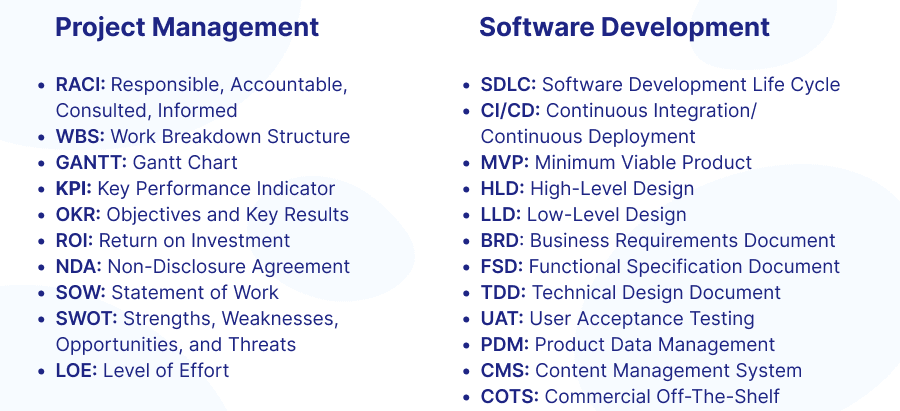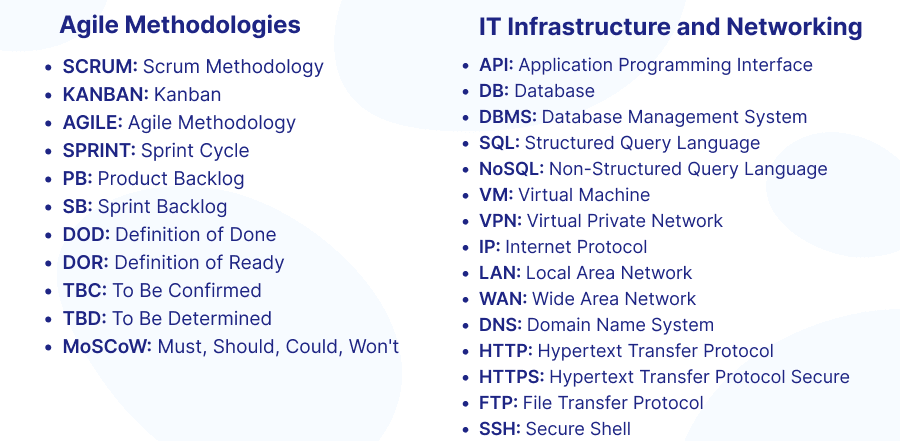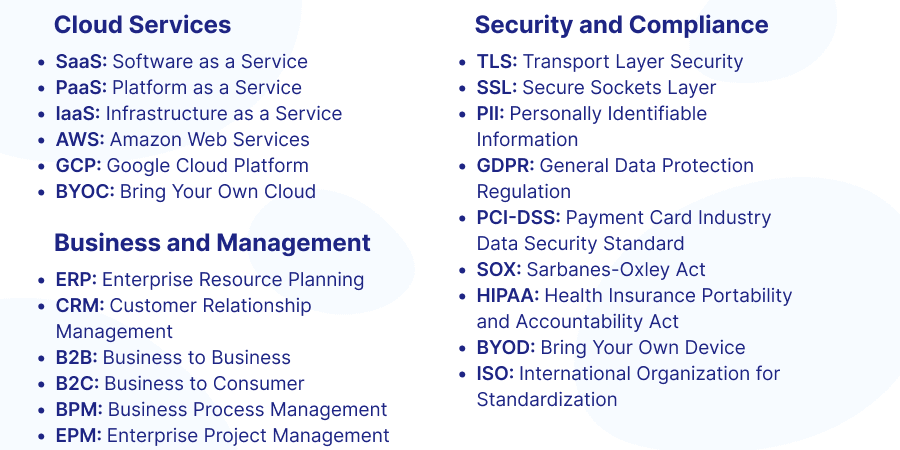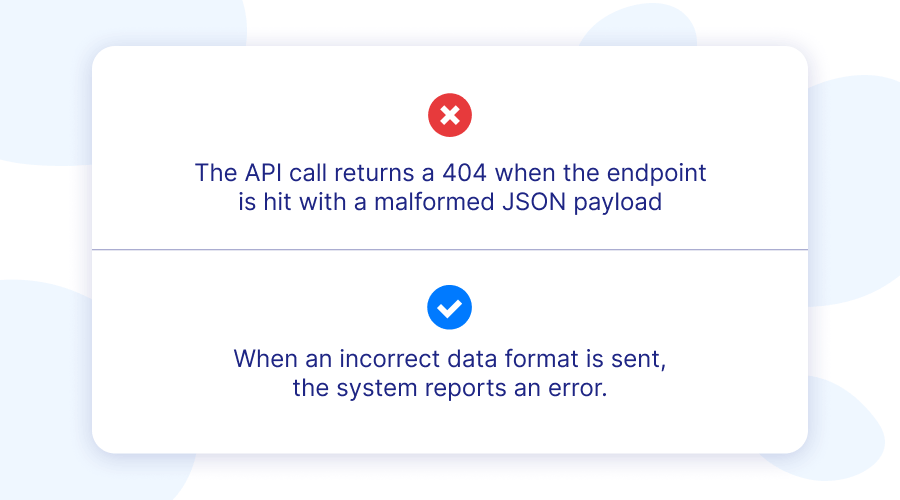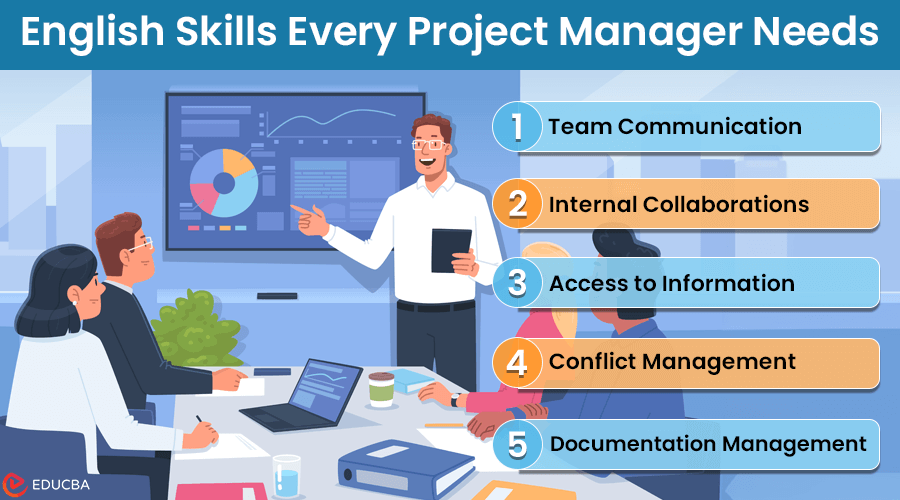
Why is it Necessary to Upskill English for Project Managers?
No matter how skilled you are as a project manager or how well you understand the flow and documentation, your job revolves around communication. In this role, your evaluation depends on how you speak. So, it is very important to upskill English for project managers.
“English is my native language. Why should I learn anything additional?” you might ask.
Whether you are a native speaker or someone who studied English in school, there’s always room for improvement. Fine-tuning your language skills can significantly impact your persuasiveness, how others perceive you, and your authority.
So, it’s time to go through some ways to make your speech sound even better.
Table of Contents
- Why is it Necessary to Upskill English for Project Managers?
- When Exactly Does Your English Matter?
- What to Focus on to Improve English for Project Managers?
- Strategies to Improve Your English
When Exactly Does Your English Matter?
Let’s break down every situation where English may affect your work.
#1. Team Communication
How many people on your team were born in a non-English-speaking country? For example, even companies like Google have had two-thirds of their team composed of non-native English speakers who just had a working-level ability.
For instance, if your project update says, “Let’s discuss this issue offline,” some team members (non-native English speakers or people unfamiliar with the idiom) might be confused. It is unclear whether they must come to the office to speak with you, especially if you are in different countries.
As a project manager, you may have a team in multiple countries. Therefore, clarity and precision are crucial when communicating in English.
#2. Internal Collaborations
English is the universal language of international business. Partners, investors, and stakeholders often come from different countries and cultures. Therefore, everyone must communicate in English to ensure clear communication when writing emails, leading meetings, and negotiating issues.
For example, suppose you are leading a meeting with a team in India, investors in Germany, and a supplier in Mexico. Everyone needs to understand the project goals, timelines, and deliverables in that case. Language is the key to achieving effective communication in such scenarios.
#3. Access to Information
Statistics reveal that a significant 50.1% of all websites are in English. Most published market trends, business guides, and data are originally in English.
For example, search for the most recent industry reports to guide your project strategy. You will find that the most comprehensive and up-to-date resources are typically available in English. In addition, content in English is dominant on platforms such as LinkedIn, Harvard Business Review, and industry-specific forums.
Insufficient English skills could limit your ability to access important information, putting you at a disadvantage.
#4. Conflict Management
No matter how hard you try to explain things, misunderstandings can happen. As a project manager, you must manage, resolve, and de-escalate situations effectively.
For example, when a developer and a tester have conflicting views on the acceptance criteria for a feature, a project manager must understand their technical arguments and communicate a clear, unified requirement in simple and easily understandable language.
#5. Documentation Management
A project manager should be skilled at handling documentation. Investments from international partners, reports to company owners, and business contracts—99.9% of those are in English. Any mistakes due to poor language skills can be financially costly and detrimental to credibility.
For example, imagine drafting a contract for an international partner. A small error in language can lead to legal issues or misunderstandings about project terms.
Additionally, detailed project documentation ensures that all stakeholders are aligned. Accurate and well-written documents save time and reduce the risk of errors.
What to Focus on to Improve English for Project Managers?
Even if you read English books, watch movies without subtitles, and chat with foreigners for hours, it does not mean your English is perfect for the project manager’s job.
#1. Vocabulary
As a project manager, you need to know all the terms, abbreviations, and jargon related to your project. Do you know what a contingency plan, Kanban, and SWOT analysis are? If yes, that’s great. But can you explain it to your team members in simple and clear words? If not, it’s just the time to change it.
Pay attention to the vocabulary related to such topics:
- Self-presentation (personal branding, elevator pitch, credentials)
- Networking (icebreaker, rapport, reciprocity)
- Meetings moderation (agenda, facilitation, action item, consensus-building)
- Negotiations (leverage, deadlock, compromise, bargaining position, win-win, concession, negotiation strategy, counteroffer, settlement)
- Giving feedback (constructive criticism, growth zones, improvement areas, performance review, 360-degree feedback, development plan, feedback loop)
- Planning (milestones, sprint, scope, Gantt charts, resource allocation, backlog, risk assessment, dependencies, deliverables)
- Document management (version control, metadata, document workflow, compliance)
In addition, there are certain work phrases that you need to know and be able to use. These include:
- Let’s circle back on that.
- Action items for today are…
- I’ll send out the minutes after the meeting.
- Can you give us a status update?
- We need to align on this.
- Any blockers or dependencies?
- I’ll loop you in.
- Let’s table this discussion for now.
- Let’s touch base on that.
- That’s not in the scope of this sprint.
- What’s the ETA on that?
- Let’s revisit this in our next meeting.
And finally, abbreviations are kings and queens in IT, so the PM (which is already proof for this point) needs to know about all the KPIs, UX, ROIs, APIs, and so on. The 50+ main abbreviations PM should know may look something like this:
#2. Writing
No matter where you are in your career, strong writing skills are essential. You will often need to craft business emails, resumes, cover letters, contracts, and reports — each with its own structure and format. These requirements can vary significantly between local and international markets. For example, a resume in the U.S. shouldn’t exceed two pages, whereas in Spain and Greece, they expect a detailed 5-page resume.
To improve your business writing, study samples created by professionals. You can find these within your company or online. Here are some key tips to keep in mind:
- Consistency: Same fonts, headings, and bullet points.
- Proper email etiquette: In your emails, include a clear subject line, greeting, body, and closing.
- Clarity and precision: No one in the team should play mind games and try to guess the meaning of your words.
- Brevity: Keep messages concise. Use bullet points instead of long sentences where possible.
- Use of visuals: Where appropriate, use visuals like graphs, tables, and charts to clarify information.
- Technical jargon: Use relevant technical terms appropriately, but avoid excessive jargon that even team members might not understand.
- Active voice vs. passive voice: Stick to active voice for clearer and more engaging communication.
- Professional tone: Be respectful and maintain a professional tone while communicating, even when addressing concerns or issues.
Strategies to Improve Your English
As long as you know what and why you need to study, another important question arises: Where? Your options depend on how much time you can dedicate to it, how much money you are ready to spend, your current level, and what form of study you prefer.
Generally, for project managers willing to improve their English, there are three main choices:
#1. Specialized Language Courses
Type “English for PMs online” or “School of Business English” or any similar query in Google, and you will get it — 10+ pages of schools, online courses, in-person classes, individual lessons, groups, you name it.
The key advantages of this option are the affordable price (up to $200 per month) and a chance to exchange experiences with other students. At the same time, such courses have a set schedule, and it isn’t always work-friendly.
#2. Private Lessons
You can also find a personal English tutor and get a customized program tailored to your needs. Additionally, you can get a flexible schedule and the ability to focus on specific language skills that need improvement. The key challenge is finding the right tutor.
Consider trying trial lessons with several teachers. When you find a good match, don’t hesitate to sign a tutoring contract. It should cover the details of your cooperation, including:\
You can take lessons without such agreement. But if any issues come up, like a scheduling conflict or a disagreement on payment, resolving them might be tricky.
#3. Self-education
Luckily, the internet gives us access to unlimited knowledge. If you feel you have enough motivation and self-discipline to study English on your own, you are free to choose from a wide range of options. Here are a few of them:
Final Thoughts
If you are a project manager aiming high, start by mastering English. It is not just a “plus” on your CV; it’s a basic skill essential for growth. Good English skills let you share your brilliant ideas with more people and lead bigger teams. But to be effective in front of a large audience, you need to practice. Whether it’s self-study, tutoring, or online courses, choose what works for you and become a professional any company would want.
Recommended Articles
We hope this guide on mastering English for project managers helps you improve your English as a PM. If you liked this blog, here are some similar guides you will also like.



